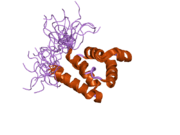MNDA
Myeloid cell Nuclear Differentiation Antigen is a protein that in humans is encoded as MNDA gene.[3][4][5]
The myeloid cell nuclear differentiation antigen (MNDA) is detected only in nuclei of cells of the granulocyte-monocyte lineage. A 200-amino acid region of human MNDA is strikingly similar to a region in the proteins encoded by a family of interferon-inducible mouse genes, designated Ifi-201, Ifi202, and Ifi-203, that are not regulated in a cell- or tissue-specific fashion. The 1.8-kb MNDA mRNA, which contains an interferon-stimulated response element in the 5' UTR, was significantly upregulated in human monocytes exposed to interferon alpha. MNDA is located within 2,200 kb of FCER1A, APCS, CRP, and SPTA1. In its pattern of expression and/or regulation, MNDA resembles IFI16, suggesting that these genes participate in blood cell-specific responses to interferons.[5]
References
- 1 2 3 GRCh38: Ensembl release 89: ENSG00000163563 - Ensembl, May 2017
- ↑ "Human PubMed Reference:".
- ↑ Briggs JA, Burrus GR, Stickney BD, Briggs RC (Sep 1992). "Cloning and expression of the human myeloid cell nuclear differentiation antigen: regulation by interferon alpha". J Cell Biochem. 49 (1): 82–92. PMID 1644857. doi:10.1002/jcb.240490114.
- ↑ Briggs RC, Briggs JA, Ozer J, Sealy L, Dworkin LL, Kingsmore SF, Seldin MF, Kaur GP, Athwal RS, Dessypris EN (May 1994). "The human myeloid cell nuclear differentiation antigen gene is one of at least two related interferon-inducible genes located on chromosome 1q that are expressed specifically in hematopoietic cells". Blood. 83 (8): 2153–62. PMID 7512843.
- 1 2 "Entrez Gene: MNDA myeloid cell nuclear differentiation antigen".
Further reading
- Burrus GR, Briggs JA, Briggs RC (1992). "Characterization of the human myeloid cell nuclear differentiation antigen: relationship to interferon-inducible proteins.". J. Cell. Biochem. 48 (2): 190–202. PMID 1377701. doi:10.1002/jcb.240480210.
- Ott J, Fràter-Schröder M (1982). "Absence of linkage between transcobalamin II and ABO.". Hum. Genet. 59 (2): 164–5. PMID 7327575. doi:10.1007/BF00293068.
- Dawson MJ, Trapani JA, Briggs RC, et al. (1995). "The closely linked genes encoding the myeloid nuclear differentiation antigen (MNDA) and IFI16 exhibit contrasting haemopoietic expression.". Immunogenetics. 41 (1): 40–3. PMID 7806273. doi:10.1007/BF00188431.
- Briggs R, Dworkin L, Briggs J, et al. (1994). "Interferon alpha selectively affects expression of the human myeloid cell nuclear differentiation antigen in late stage cells in the monocytic but not the granulocytic lineage.". J. Cell. Biochem. 54 (2): 198–206. PMID 8175894. doi:10.1002/jcb.240540208.
- Xie J, Briggs JA, Briggs RC (1998). "Human hematopoietic cell specific nuclear protein MNDA interacts with the multifunctional transcription factor YY1 and stimulates YY1 DNA binding.". J. Cell. Biochem. 70 (4): 489–506. PMID 9712147. doi:10.1002/(SICI)1097-4644(19980915)70:4<489::AID-JCB6>3.0.CO;2-F.
- Doggett KL, Briggs JA, Linton MF, et al. (2002). "Retroviral mediated expression of the human myeloid nuclear antigen in a null cell line upregulates Dlk1 expression.". J. Cell. Biochem. 86 (1): 56–66. PMID 12112016. doi:10.1002/jcb.10190.
- Strausberg RL, Feingold EA, Grouse LH, et al. (2003). "Generation and initial analysis of more than 15,000 full-length human and mouse cDNA sequences.". Proc. Natl. Acad. Sci. U.S.A. 99 (26): 16899–903. PMC 139241
 . PMID 12477932. doi:10.1073/pnas.242603899.
. PMID 12477932. doi:10.1073/pnas.242603899. - Fukushi M, Higuchi M, Oie M, et al. (2004). "Latency-associated nuclear antigen of Kaposi's sarcoma-associated herpesvirus interacts with human myeloid cell nuclear differentiation antigen induced by interferon alpha.". Virus Genes. 27 (3): 237–47. PMID 14618084. doi:10.1023/A:1026391715071.
- Gerhard DS, Wagner L, Feingold EA, et al. (2004). "The status, quality, and expansion of the NIH full-length cDNA project: the Mammalian Gene Collection (MGC).". Genome Res. 14 (10B): 2121–7. PMC 528928
 . PMID 15489334. doi:10.1101/gr.2596504.
. PMID 15489334. doi:10.1101/gr.2596504. - Briggs RC, Atkinson JB, Miranda RN (2005). "Variable expression of human myeloid specific nuclear antigen MNDA in monocyte lineage cells in atherosclerosis.". J. Cell. Biochem. 95 (2): 293–301. PMID 15778972. doi:10.1002/jcb.20435.
- Asefa B, Dermott JM, Kaldis P, et al. (2006). "p205, a potential tumor suppressor, inhibits cell proliferation via multiple pathways of cell cycle regulation.". FEBS Lett. 580 (5): 1205–14. PMID 16458891. doi:10.1016/j.febslet.2006.01.032.
- Briggs RC, Shults KE, Flye LA, et al. (2006). "Dysregulated human myeloid nuclear differentiation antigen expression in myelodysplastic syndromes: evidence for a role in apoptosis.". Cancer Res. 66 (9): 4645–51. PMID 16651415. doi:10.1158/0008-5472.CAN-06-0229.
External links
- MNDA protein, human at the US National Library of Medicine Medical Subject Headings (MeSH)
This article incorporates text from the United States National Library of Medicine, which is in the public domain.




